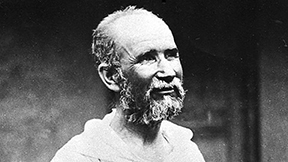
“My God, if you exist, let me come to know you.” This was the repeated prayer of Charles de Foucauld after he undertook an exploration into Morocco from 1883 to 1884 and witnessed the way Muslims expressed their faith.
Having previously led a life in pursuit of pleasure, Charles became a “revert” to the Catholic faith at 28 years old, spending the rest of his life dedicated to Christ.
Charles said, “As soon as I believed in God, I understood that I could not do otherwise than to live for him alone.”
Heart of charity
In continuing his Wednesday audience series on encountering Christian witnesses and apostolic zeal, Pope Francis reflected on the heart of charity that is alive in the inner life through the example of St. Charles.
Charles de Foucauld was born in Strasbourg, France, in 1858.
After being orphaned at the age of six, he was raised by his wealthy and aristocratic grandfather.
Charles lost his faith in his youth and became distant from God.
In 1876, he joined the Saint-Cyr Military Academy, eventually becoming a cavalry officer.
He inherited his grandfather’s fortune and was known for living an extravagant lifestyle.
Tired of military life, he embarked on an exploration of Morocco.
Seeing the faith of others during his travels made him question his own life’s purpose.
Receiving a warm and respectful welcome from his Christian family upon his return made him search further.
He rediscovered God under the guidance of Fr. Henri Huvelin in 1886.
Pope Francis remarked that a pivotal part of Charles’ conversion was accepting the grace of God’s forgiveness in Confessions.
Charles embarked on a pilgrimage to the Holy Land to walk where Jesus had spent his life. Pope Francis said, “It is in Nazareth that he realizes he must be formed in Christ’s teachings. He experiences an intense relationship with the Lord, spends long hours reading the Gospels, and feels like His little brother. And as he gets to know Jesus, the desire to make Jesus known arises in him.”
After this encounter with Christ in the Holy Land, Charles spent seven years as a Trappist monk in France and then Syria.
Following this, he lived a solitary life of prayer and adoration near a convent of Poor Clares in Nazareth.
He firmly believed that the “Eucharistic life” evangelizes.
Fueled by a desire to live among those who were “the furthest removed, the most abandoned,” he was ordained a priest at age 43 and went to live in the Sahara among the Tuaregs of the Hoggar.
Pope Francis explained that Charles “decides to settle in distant regions to cry out the Gospel in silence, living in the spirit of Nazareth, in poverty and concealment . . . and he goes there as a friend and a brother, bearing the meekness of Jesus the Eucharist.”
Charles prayed for hours every day and offered hospitality to all who passed through.
He learned the Tuareg language and composed a French-Tuareg dictionary that is still used today.
Living a life of Christ allowed Brother Charles to forge strong bonds with the poor.
“Gradually these bonds generated fraternity, inclusion, appreciation of the other’s culture,” said Pope Francis.
Influence around the world
Today, Brother Charles is known around the world by the title of “Universal Brother,” and he continues to have an important influence on Muslim-Christian religious dialogue.
Pope Francis draws out multiple lessons for us from the life of Brother Charles.
First, the life of St. Charles de Foucauld demonstrates key points on evangelization.
Brother Charles stated the reason for his life was that “I have lost my heart to Jesus of Nazareth”.
Charles’ life was transformed as he “went from attraction to Jesus to imitation of Jesus”.
The Holy Father stated, “When one of us gets to know Jesus better, the desire to make him known, to share this treasure, arises.”
We cannot evangelize if we don’t first have Jesus in our own hearts.
Otherwise, as Pope Francis explains, “We risk talking about ourselves or a set of rules instead of about Jesus and his love and mercy.”
Second, we must return to the Eucharist.
The Holy Father said, “We have lost the sense of adoration: We must regain it.”
Finally, we are all called to be apostles and witnesses.
Charles de Foucauld wrote: “Every Christian, then, must become an apostle.”
He elaborated that “Close to priests, we need laypeople who see what the priest does not see, who evangelize with a closeness of charity, with a kindness for all, with an affection always ready to give of itself”.
Pope Francis affirmed that Charles understood that “the proclamation of the Gospel is up to the entire people of God”.
In his surrender to Christ, St. Charles reminds us of the evangelizing power of meekness and tenderness.
Pope Francis concludes his audience by reminding us that God is always near, compassionate, and tender, and Christian witnesses must always take this road.
May all of us seek to draw closer to Christ in the Eucharist and carry with us Christian meekness, compassion, and tenderness.

